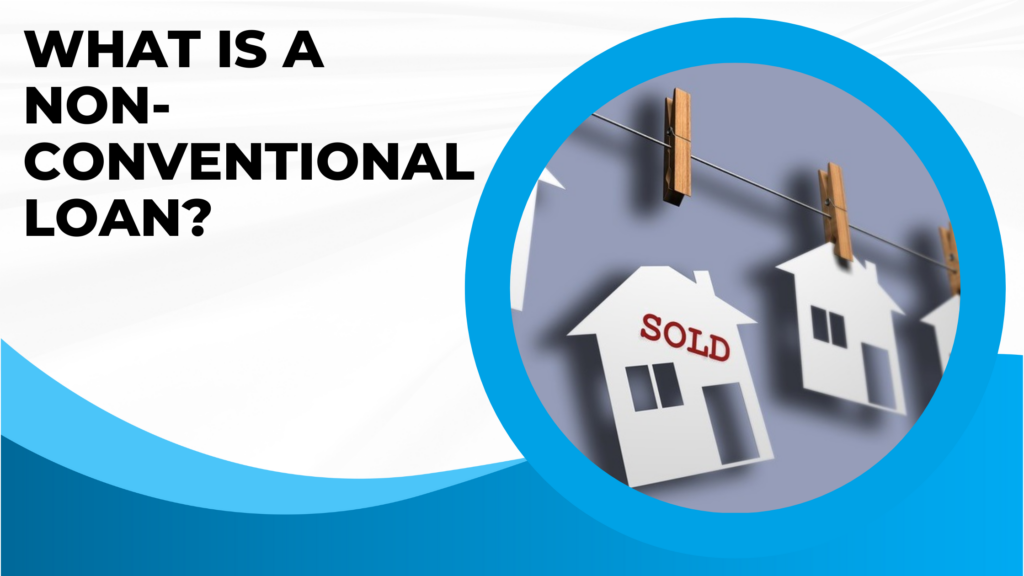Non-conventional loans are an important financing option for many homebuyers who don’t qualify for conventional loans backed by Fannie Mae and Freddie Mac. While conventional loans are the most common, non-conventional loans provide more flexibility and options for those with unique financial situations. In this comprehensive guide, we’ll explore the most common examples of non-conventional loans and who they are best suited for.
What is a Non-Conventional Loan?
A non-conventional loan is simply any mortgage that doesn’t conform to the requirements set forth by Fannie Mae and Freddie Mac Non-conventional loans commonly include jumbo loans (those above Fannie Mae and Freddie Mac limits) and government-backed loans like VA loans, FHA loans or USDA loans.
The key benefit of a non-conventional loan is providing financing options for borrowers who can’t qualify for a conventional loan Reasons could include a low credit score, high debt-to-income ratio, insufficient credit history, or the need for a low down payment.
While non-conventional loans offer more flexibility it’s important to note they often come with higher interest rates, mortgage insurance premiums and fees compared to conventional loans.
FHA Loans
One of the most popular non-conventional loan programs is the Federal Housing Administration (FHA) loan. FHA loans are government-insured, allowing for low down payments and more lenient credit score and debt-to-income requirements.
Here are some key details on FHA loans:
- Minimum Credit Score: 500-580
- Down Payment: 3.5%
- Maximum Loan Amount: Up to $420,680 in most areas
- Mortgage Insurance: Required when down payment is under 20%
FHA loans appeal to first-time homebuyers and those with past financial struggles. The low down payment and flexible credit policies make homeownership attainable for more buyers.
VA Loans
VA loans are backed by the U.S. Department of Veterans Affairs and offer zero down payment options for qualifying service members and veterans. Some details on VA loans:
- Eligibility: Must be an active duty or veteran who satisfies service requirements
- Minimum Credit Score: No set minimum, typically around 620
- Down Payment: None required
- Maximum Loan Amount: No limit, approval based on income/debt ratios
VA loans give eligible borrowers purchasing power since they don’t require a down payment. This makes them one of the most competitive non-conventional loan programs.
USDA Loans
For moderate income buyers in suburban or rural areas, USDA loans are a popular choice. Insured by the U.S. Department of Agriculture, here are some USDA loan perks:
- Eligibility: Must meet income limits and purchase in eligible rural area
- Minimum Credit Score: Typically 640
- Down Payment: None required
- Maximum Loan Amount: Varies, typically $420,680
USDA loans promote homeownership for rural communities by offering no down payment financing. Income and location restrictions ensure loans go to intended recipients.
Jumbo Loans
Jumbo loans fund purchases above conforming loan limits set by the Federal Housing Finance Agency (typically $702,000). Buyers needing jumbo loans typically have higher incomes and larger down payments.
- Minimum Credit Score: 700+
- Down Payment: 15-20%
- Maximum Loan Amount: Varies, above $702,000
Jumbo borrowers usually need pristine credit and finances to qualify. While interest rates are similar to conforming loans, requirements are more stringent.
Non-Traditional Loans
There are also more unique, non-traditional non-conventional loans like:
- Hard Money Loans: Asset-backed financing from private lenders, higher rates/fees than traditional loans
- Private Loans: Financing from individuals instead of institutions, typically higher rates
- Owner Financing: The seller provides financing to the buyer, often at below market rates
These loans fill gaps for borrowers who can’t get traditional financing but have assets, strong seller relationships, or other unique advantages.
Which Loan is Right For You?
Choosing the right non-conventional loan depends entirely on your financial situation and goals as a homebuyer. Be sure to ask potential lenders and mortgage brokers plenty of questions to understand all your options.
In general:
- FHA loans help those with past credit issues access low down payment financing
- VA loans serve eligible veterans and service members who want to purchase without a down payment
- USDA loans promote rural homeownership for moderate income borrowers
- Jumbo loans give high-income buyers with sizable down payments access to higher amounts
While conventional loans are ideal, non-conventional options open doors for borrowers across a wide range of circumstances. Reach out to lenders to find a loan that fits your unique needs.

What Is A Non-Conforming Loan?
Your Credit Profile Excellent 720+ Good 660-719 Avg. 620-659 Below Avg. 580-619 Poor ≤ 579
When do you plan to purchase your home? Signed a Purchase Agreement Offer Pending / Found a House Buying in 30 Days Buying in 2 to 3 Months Buying in 4 to 5 Months Buying in 6+ Months Researching Options
Do you have a second mortgage?
Are you a first time homebuyer?
Consent:
By submitting your contact information you agree to our Terms of Use and our Privacy Policy, which includes using arbitration to resolve claims related to the Telephone Consumer Protection Act.! NMLS #3030
Congratulations! Based on the information you have provided, you are eligible to continue your home loan process online with Rocket Mortgage.
If a sign-in page does not automatically pop up in a new tab, click here
How Does A Non-Conforming Loan Work?
Apply online for expert recommendations with real interest rates and payments.
Conventional VS Non-Conventional Loans (What Are The Different Type Of Loans?)
FAQ
What is considered a non conventional loan?
What is the meaning of unconventional loan?
What is an example of a non-conforming loan?
What is an example of a conventional loan?
